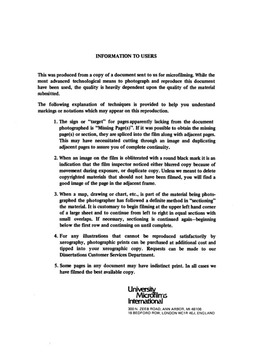| dc.contributor.author | Rykowski, Thomas John, | en_US |
| dc.date.accessioned | 2013-08-16T12:28:21Z | |
| dc.date.available | 2013-08-16T12:28:21Z | |
| dc.date.issued | 1981 | en_US |
| dc.identifier.uri | https://hdl.handle.net/11244/4864 | |
| dc.description.abstract | The first Americans in Oregon came mostly from the Midwest where their ancestors had settled after leaving New England. Oregon represented a place where people could live surrounded by a pleasant setting which was protected by great distance from the problems facing Eastern society resulting from industrialization, ethnic and racil diversity and urbanization. Historically, any attempt to change the Oregonian's life and feeling of freedom was responded to swiftly. The Progressive era was no different. Its purpose and ultimate goal was to protect the tradition of individual freedom which seemed threatened. The response was a series of laws, such as the direct lection of senators, referendum, recall, direct primary, workman's compensation, and woman's suffrage, which were passed with bi-partisan unity. The reforms allowed Oregon to be insulated from change whether racial, political, or cultural. Thus Oregon Progressives allowed the people to preserve the society of the past by creating tools of a democratic government. | en_US |
| dc.description.abstract | The conclusions reached found a movement motivated by the importance of personal independence, reverence for land and nature, and a desire to maintain a way of life. Oregonians believed their society was special and their efforts which were labeled as Progressive or forward looking were actually preservationist. The legislation passed between 1900-1910 and labeled the "Oregon System, " as an attempt to protect and perpetuate the established society. | en_US |
| dc.description.abstract | This study was concerned with the motivation and direction of Progressivism in Oregon. The major problem which confronted me was why such a conservative state with its homogeneous W.A.S.P. population, isolated geographic location, rural lifestyle, and lacking problems faced by other states would become the leader in implementing Progressive reforms. | en_US |
| dc.format.extent | vi, 260 leaves ; | en_US |
| dc.subject | History, United States. | en_US |
| dc.title | Preserving the garden : | en_US |
| dc.type | Thesis | en_US |
| dc.thesis.degree | Ph.D. | en_US |
| dc.thesis.degreeDiscipline | Department of History | en_US |
| dc.note | Source: Dissertation Abstracts International, Volume: 42-02, Section: A, page: 0824. | en_US |
| ou.identifier | (UMI)AAI8116755 | en_US |
| ou.group | College of Arts and Sciences::Department of History | |
